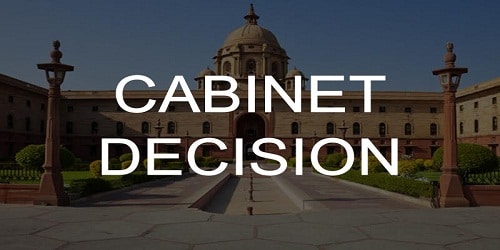The Cabinet Committee on Economic Affairs(CCEA) chaired by the Prime Minister(PM) Shri Narendra Modi approved the following pacts/agreements with the foreign countries on November 27, 2019. The approval in detail are as follows, Cabinet approval on MoU between India and Saudi Arabia:
Cabinet approval on MoU between India and Saudi Arabia:
Approval on Strategic Partnership Council:
The CCEA has approved the agreement signed by the PM on 29th October, 2019 for establishment of Strategic Partnership Council between India and Saudi Arabia.
- The agreement will help both the nations to meet regularly and monitor the progress in the ongoing initiatives/projects under the strategic partnership.
- The approval will benefit the citizens with improved economic and commercial linkages with Saudi Arabia irrespective of their gender, class or income bias.
- The agreement will create cooperation between both the nations in areas of defence, security counter-terrorism, energy security and renewable energy.
Approval for combating illicit trafficking, smuggling drugs, psychotropic substances and chemical precursors:
CCEA has approved the Memorandum of Understanding (MoU) signed by India and Saudi Arabia in combating illicit trafficking, smuggling narcotic drugs, psychotropic substances and chemical precursors. Under the MoU, the cooperation for the above mentioned field will be done based on the United Nations(UN) international drug control conventions.
MoU features:
- Under the MoU, relevant information as well as methods, identities and suspicious activities of producers, smugglers and traffickers of narcotic drugs, details of trafficking of NDPS (Narcotic Drugs and Psychotropic Substances) etc will be exchanged.’
- Details of the arrested citizen of the other Party for committing the crime of illicit trafficking or smuggling of NDPS will be provided.
- exchange of chemical reports/analysis of NDPS will be done.
MoU between India and Myanmar on bilateral cooperation for Prevention of Trafficking in Persons approved:
CCEA approved the MoU between India and Myanmar on bilateral cooperation for prevention of trafficking in persons, rescue, recovery, repatriation and reintegration of victims of trafficking.
MoU features:
- The MoU will enhance bilateral cooperation between both the nations. database on traffickers and victims of trafficking in a safe and confidential manner will be exchanged.
- Speedy investigation and prosecution of traffickers and organized crime syndicates in either country will be ensured. Immigration and border control cooperation will be strengthened.
- Working groups/ task force will be set up to prevent human trafficking.
Protocol between India and Chile for the avoidance of double taxation approved:
CCEA approved the signing of the Double Taxation Avoidance Agreement (DTAA) and Protocol between the Republic of India and the Republic of Chile for the elimination of double taxation and the prevention of fiscal evasion and avoidance with respect to taxes on income.
Impact of agreement:
- Allocation of taxing rights between contracting states through the agreement will provide will provide tax certainty to investors & businesses of both countries. Flow of investment through fixing of tax rates in source State on interest, royalties and fees for technical services will be augmented.
- Under the agreement, minimum standards and other recommendations of G-20 OECD Base Erosion Profit Shifting (BEPS) Project will be implemented. OECD means Organisation for Economic Co-operation and Development.
- Tax planning strategies which exploit gaps and mismatches in tax rules will be curbed(stopped/prevented) through the BEPS project.
India’s Approach to UN Climate Change Conference to be held in Spain approved:
CCEA has approved the negotiating stand of India at the 25th Conference of Parties (COP) to the United Nations Framework Convention on Climate Change (UNFCCC) scheduled to be held in Madrid, Spain (Under the presidency of Chile). The convention will take place from December 2-13, 2019.
- Indian delegation: The Indian delegation will be led by Minister of Environment, Forest and Climate Change. (MoEFCC) Shri Prakash Javadekar. India’s approach will be guided by the principles & provisions of UNFCCC and Paris Agreement, particularly the principles of Equity and Common But Differentiated Responsibilities and Respective Capability (CBDR-RC).
Key Points:
i.India’s action on climate change:
- In the 2019 UN Climate Action Summit which was held in New York, United States(US), PM Modi announced scaling up of renewable energy target to 450 GW by 2030 and called for responsible action by all on the principles of equity and CBDR-RC.
- India leads the world in its pursuit of enhanced solar energy capacity through International Solar Alliance (ISA).
- Apart from the ISA, two more new initiatives were also launched. These include Coalition for Disaster Resilient Infrastructure (CDRI), that will serve as a platform to generate and exchange knowledge on different aspects of climate and disaster resilient infrastructure and ‘Leadership Group for Industry Transition’ to provide a platform for government and the private sector in different countries to work together on accelerating low carbon growth and cooperation in the area of technology innovation.
- The ‘Leadership Group for Industry Transition’ was jointly launched by India and Sweden.
- India emphasized that developed countries should take the lead in undertaking ambitious actions and fulfil their climate finance commitments of mobilizing $100 billion per annum by 2020.
ii.COP 25: COP 25 an important conference where countries move from pre-2020 period under the Kyoto Protocol to post-2020 period under the Paris Agreement. The conference is aimed to take the next crucial steps in the UN climate change process.
About Saudi Arabia:
Capital- Riyadh.
Currency- Saudi riyal.
King- Salman bin Abdulaziz Al Saud.
Official language- Arabic.
About Myanmar:
Capital- Naypyitaw.
Currency- Burmese kyat.
President- Win Myint.
About Chile:
Currency- Chilean peso.
Capital- Santiago.
President- Sebastián Piñera.
About Spain:
Capital- Madrid.
Currency- Euro.
Prime Minister(PM)- Pedro Sánchez.





